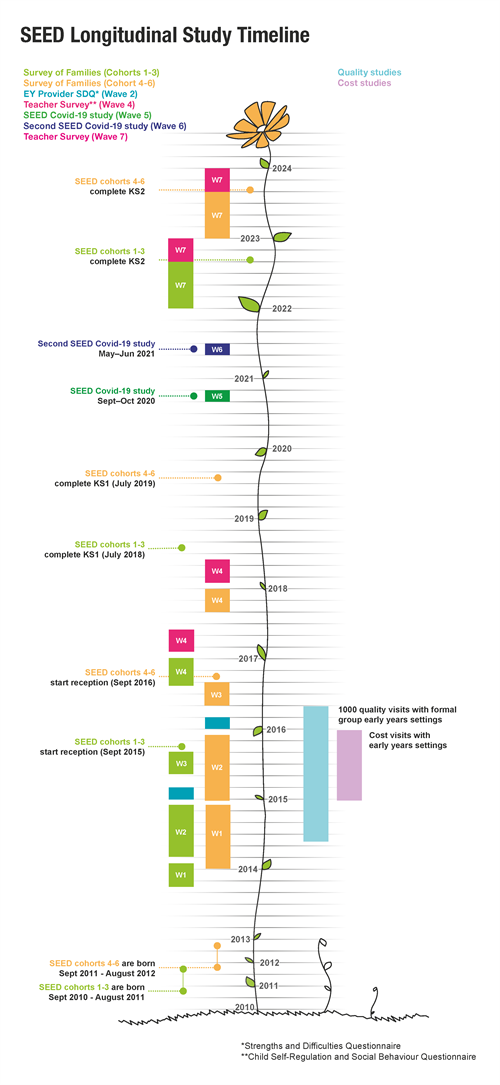Background and study design
What is SEED?
The Study of Early Education and Development (SEED) is a major longitudinal study following nearly 6,000 children from across England from age two. It started in 2013, and it is funded by the Department for Education (DfE).
DfE have extended the SEED study to 2029. The National Centre for Social Research (NatCen) will deliver the extension in collaboration with University College London, Durham University, University of Bristol and SQW.
The latest wave is taking place in 2023. We are excited to return to face-to-face fieldwork with families. This wave also includes a short survey with the class teachers of SEED children.
The original SEED study (2013-2021) was carried out by NatCen in collaboration with Frontier Economics, the University of Oxford and Action for Children.
Who are the families in SEED?
Just under 6,000 families took part in the baseline survey over the period from October 2013 to November 2014. Most children in the study were two years old at the time of the baseline interview. The sample of families in the SEED study is representative of the population of families with children aged two in England at the time.
Children in SEED were born over a two year period (September 2010 to August 2012), and are divided into six cohorts according to the term in which they were born.
The sample was designed to have three subgroups sampled in equal proportion, i.e. such that each group made up around a third of the sample in each cohort. The three subgroups were:


What does the study involve?
The study involves a number of strands of work:
- A longitudinal survey of almost 6,000 children aiming to find out how characteristics of the early environment, including early childhood education and care, relate to child development over time. This strand involves:
- Interviews with families when children are age two, three, four, five and ten
- Surveys with childcare staff and school teachers
- Linking to educational attainment data in the National Pupil Database
- A study of quality in 1,000 group based early years settings and around 100 childminders being used by children in the study. This aims to understand what is important for high quality childcare provision and how the quality of provision relates to child outcomes.
- A study of the value for money of early childhood education and care.
- COVID-19 studies in 2020 and 2021: In the of autumn 2020, NatCen carried out a special wave of the SEED survey of families to capture experiences during the first few months of the COVID-19 pandemic and to investigate the effects of the pandemic and school closures on children and their families. Over 1,800 families took part in this study, completing the questionnaire either online or on the phone. In May and June 2021, another special wave of the SEED study took place. It included questions about the period of school closures in winter 2021 as well as more general questions about how the children and families were getting on. It was also carried out as a web-telephone survey. Results of these special waves of SEED were published in 2021 and can be found on the Findings page.
-
In 2023 a new wave of face-to-face fieldwork with families is taking place. This wave also includes a short survey with the class teachers of SEED children, examining the children’s attitudes, behaviours and developments in school.
- Qualitative studies
- Interviews to investigate the views of childminders
- Case studies of good practice in group based providers
- A study of providers’ experiences of the Early Years Pupil Premium
- A study of early education provision for children with special educational needs and disabilities involving interviews with families and staff at early years settings.
The future of SEED
The Department for Education have extended the SEED study to 2029, so that SEED continues to follow the progress of young people in the longitudinal survey until they are in secondary school year 11. The National Centre for Social Research (NatCen) has been commissioned in collaboration with University College London, Durham University, University of Bristol and SQW, to deliver the SEED study over 2021-2029.

